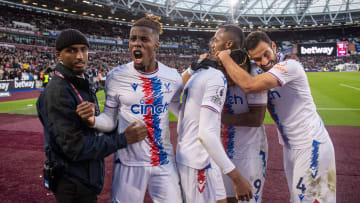Why did Bournemouth and Southampton both bring new managers who were completely inexperienced in managing at this level of the game with the stakes so high?
For the three south coast clubs of the Premier League, it was a weekend much like so many others this season; Brighton won while Bournemouth and Southampton lost. The contrast seems pretty stark.
While Brighton are basking in the revelry of what is surely their greatest ever team despite substantial destabilisation wrought upon them by external forces beyond their control, Bournemouth and Southampton are labouring under the weight of managerial changes which were entirely within their control.
Promoting from within and hoisting up a well-regarded name from a lower division both carry a certain romantic appeal, but they don’t come without an element of gamble, even more than making the decision to change the manager in the first place. And while the gaps between teams do remain wafer thin in the bottom half of the Premier League, three have to drop come the end of this season, and it’s difficult to see past these two making up two of the places. They look doomed.
Bournemouth have had a season of extreme disruption with a return to the Premier League and a change of ownership. The decision to relieve Scott Parker of his duties after just four games was probably justified, but it feels as though the club was sucked into making the wrong decision in replacing him with Gary O’Neil.
Having taken them to promotion at the end of the previous season, we might have expected that Parker would have been given more than four games to set his team on course, but this has to be balanced by the fact that they conceded 16 goals in three games, including a 9-0 hammering at Liverpool which has somehow managed to age so badly that it looks worse with every passing week.
It does rather feel as though Parker may have been fired as a knee-jerk reaction to that Liverpool result. Gary O’Neil – previous coaching experience: six months as the assistant manager of Liverpool’s under-23s and a year and a half as a coach at Bournemouth – was handed the position on a caretaker basis, but there seemed little movement in terms of bringing in a replacement. When the team initially reacted well to his appointment, talk began that he may given the position on a permanent basis.
Parker was relieved of his duties on August 30, but O’Neil’s job was not made permanent until the end of November. He’d started impressively as caretaker, with a six-game unbeaten run momentarily lifting them to mid-table, but the slide had already begun, masked by two handsome wins against an Everton team engulfed in an even greater slump. Prior to those games, Bournemouth had lost four straight Premier League games and three of those had come against Southampton, West Ham and Leeds, all teams near the bottom of the table.
Things haven’t improved since the World Cup break, with a single point from six games. When Bournemouth returned, they were in 14th place in the Premier League; they’re now 19th. It’s not all terrible news. Their performance at Brighton on Saturday was not disastrous, and it took a winning goal scored three minutes from time to decide the match. This came on top of their first post-World Cup point from a 1-1 draw in their previous game against Nottingham Forest.
But that goal against Forest was the only one they’ve scored in the Premier League since those three against Everton on November 12. They did score twice against Championship leaders Burnley in the FA Cup, but Burnley scored four and knocked them out. This inability to score goals is hitting them hard. Bournemouth had chances against Brighton and they might have come away with all three points, but were unable to finish when they had the opportunity.
At least, it might be contended, Southampton had a plan. Ralph Hasenhuttl finally departed St Mary’s after his team were beaten 4-1 at home by Newcastle on the first weekend of November, and just three days later Nathan Jones had been plucked from his position at Luton Town and installed as his replacement.
But this has not been a conspicuous success either. Southampton won one and lost six of Jones’ seven Premier League games in charge of the club (I’ll give you a clue as to the identity of the only team they beat – their name begins with an ‘E’ and there was a lot of booing at the final whistle), while his bizarre press conference following a fairly shambolic performance at Brentford suggested that either he is not coping with the pressures of this job particularly well or is in some sort of state of denial over how badly things are going for him. Or possibly both. Saturday’s outburst was certainly foreshadowed.
And even his silver linings come with hefty asterisks. He did get them to the semi-finals of the EFL Cup and beat Manchester City on the way, but once there they were comfortably beaten by Newcastle. Yes, he has got them to the fifth round of the FA Cup, but that is, well, it’s a potentially loaded fixture: a home game against Luton Town or Grimsby Town. Jones’ former club have a replay to get past first – and that is by no means a given – but Luton have trundled on very much as before since Jones upped sticks.
They’re in fourth place in the Championship, just as they were on the day that Jones jumped ship and, inversely to Southampton, have won six and lost one of their last seven league games under his replacement, Rob Edwards. Should Luton get through their appointment in Cleethorpes without disruption, this match looks like a man-trap so great as to be visible from space.
The inevitable result of all of this is that the rumour mill has already started spinning, with the suggestion being that the club may have been deeply unimpressed with Jones’ comments following the Brentford match.
Bournemouth and Southampton have found their way to the foot of the Premier League table by different routes that have one crucial thing in common: they both seem to have got sucked into an idea that seems great in principle but which isn’t backed by the numbers. What, in Gary O’Neil’s couple of years at The Vitality Stadium and six months at Liverpool, persuaded the club to entrust Premier League survival to someone who had plenty of Premier League experience as a player, but none as a manager?
Of course, those who made that decision are no longer there to answer that question, with the club sold in December. How far new owner Bill Foley’s patience will stretch is unknown, but he will already be aware that the value of his investment will drop considerably should results not start to pick up. At the time of writing, Gary O’Neil has a 20% win percentage in his entire managerial career. That needs to improve.
Southampton’s decision to hire Nathan Jones made sense on one level. Luton have been successful under him and are punching well above their weight in the current Championship table. But did they not give any attention to…when this happened before? Jones left Luton for Stoke City in January 2019. He won just six out of his 38 league games in charge of the club. His return to Luton saw him pick up where he left off there, but he had a chastening ten months in the Potteries, and his record at Southampton has really been no better than it was there.
This does not compare well to the efficient and data-backed decision of Brighton & Hove Albion to bring in Roberto De Zerbi to fill the space left by the abrupt departure of Graham Potter at the start of September. De Zerbi might not have had any more Premier League managerial experience than Gary O’Neil or Nathan Jones, but he was proven as successful and already known for his progressive football, all backed by the numbers.
Any new manager is a gamble, but the Brighton owner Tony Bloom is a professional gambler. By comparison, the owners of both Bournemouth and Southampton look rather like mug punters.




